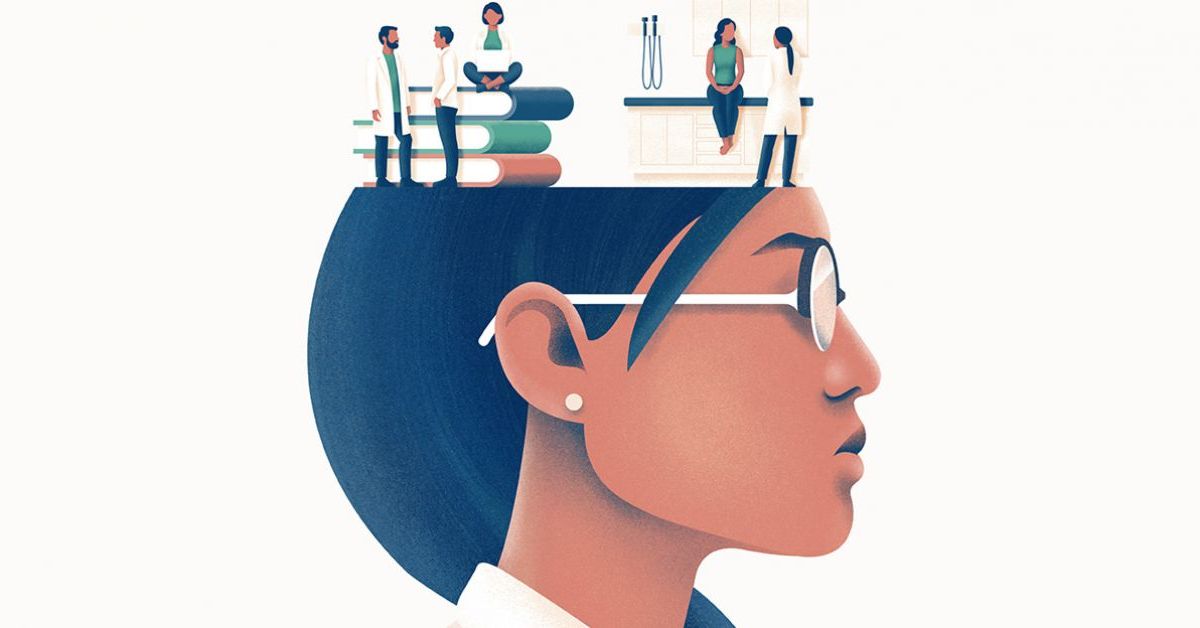Reimagining Public Health
From pandemics to health inequities, confronting future crises will look different — and that’s a good thing.
Published Date
Article Content
Unlike many of his peers, Shane Abbasi enrolled at a community college as an undeclared major. An immigrant, first-generation college student from a low-income school district, he had an interest in health care, but lacked previous exposure to educational and career options.
In his freshman year, Abbasi considered psychology and human behavior, but felt the focus was too narrow. Following advice from an academic advisor in his sophomore year, Abbasi chose public health as a major, and enrolled at the Herbert Wertheim School of Public Health and Human Longevity Science at UC San Diego where he got a multidimensional view of health that included physical and mental health, healthy policy, environmental factors, and cultural practices and behaviors.
“I was blown away by the way public health empowers students, educators, and practitioners to roll up their sleeves and work tirelessly to reach communities and transform our 'sick care' system to a health care system,” said Abbasi, who graduated with a Bachelor of Science in Public Health (BSPH) in June 2022. “This changed my life and it’s where my passion for public health began, a passion that was later confirmed by a deadly global pandemic.”
With seven education programs, the Herbert Wertheim School of Public Health is cultivating the next generation of diverse public health professionals and leaders through innovative and transformational education programs that include bachelor’s, master’s and doctoral degrees, as well as a preventive medicine residency.
21st Century School
At an especially critical time, the founding of the school of public health allows UC San Diego to leverage its research strengths to address deep and pressing 21st century public health issues locally and globally — and train the next generation of public health practitioners and researchers.
“No matter the public health challenge, whether it is infectious diseases, health equity, climate change, aging or chronic diseases, our community and our campus have a new partner to help design multipronged solutions to contemporary health problems,” said Cheryl A.M. Anderson, PhD, MPH, professor and founding dean of the Herbert Wertheim School of Public Health.
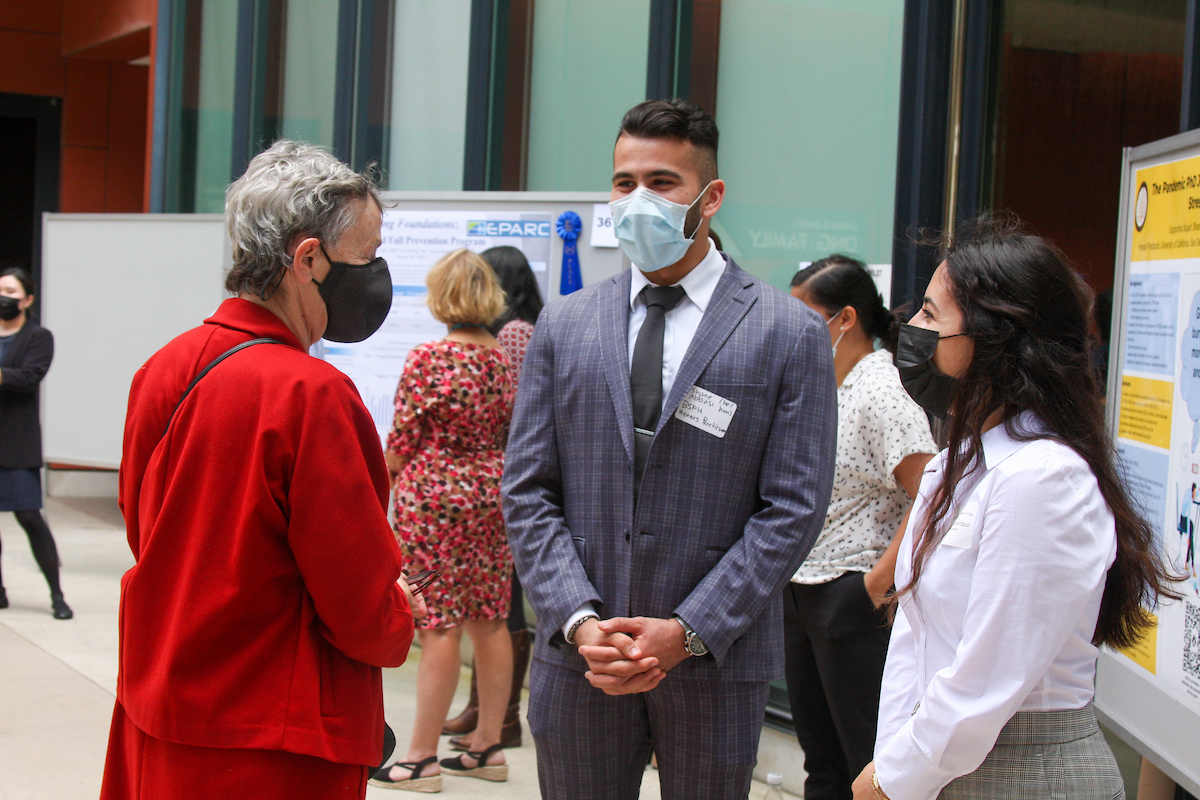
In 2020, as the school was being primed for its first academic year, it quickly became apparent that it would need to pivot its public health efforts to help mitigate the impact of the COVID-19 pandemic.
The pandemic underscored something Anderson already knew: major public health challenges require a coordinated, transformational approach with a public health lens that is informed through community partnerships and collaborations with scientists in other fields, such as medicine, social sciences, and engineering.
The Herbert Wertheim School of Public Health was involved in Return to Learn, a bold initiative to return students to the UC San Diego campus and in-class learning during the pandemic. The school partnered with the San Diego County Department of Public Health for contact tracing and contributed to the design and implementation of CA Notify — California’s COVID-19 exposure notification system using smartphone technology.
"The school of public health is at its best when our training and research efforts, as well as our community academic partnerships, are working together in a way that acknowledges the importance of diversity to true excellence and innovation."
The school dove deeper into health disparities intensified by the pandemic by addressing the clinical needs of thousands of new asylum seekers at the San Diego/Tijuana, Mexico border. With community partners, researchers investigated the negative impacts of COVID-19 on established refugee communities in San Diego.
“The school of public health is at its best when our training and research efforts, as well as our community academic partnerships, are working together in a way that acknowledges the importance of diversity to true excellence and innovation,” said Anderson, who is also the inaugural Hood Family Endowed Dean’s Chair in Public Health.
“This school is not only built for those of us who are walking through the halls in the present moment, but we are keenly aware of our need to be relevant decades from now. That means we need to recruit a diverse and inclusive type of scientist to train here and to work here.”
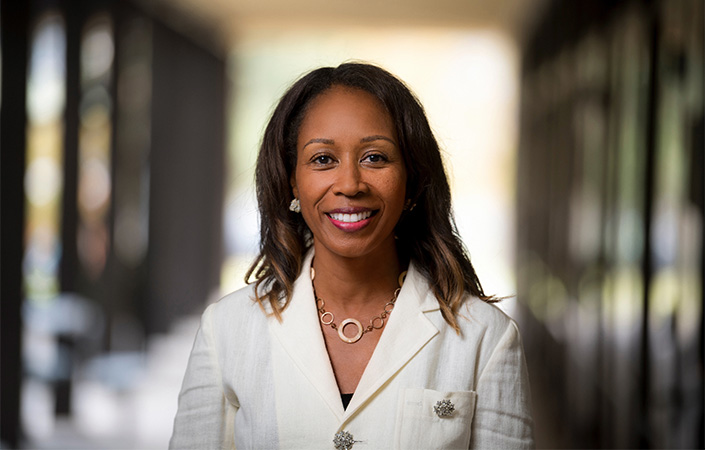
Diversity in research
The Herbert Wertheim School of Public Health launched with a core mission of “radical hospitality and inclusivity,” centering justice, equity, diversity and inclusion (JEDI) in its approach to public health research, education and service.
Among the many programs aimed at addressing JEDI is a National Institute of Aging-funded R25 undergraduate training program called Mentorship for Advancing Diversity in Undergraduate Research on Aging (MADURA). Its primary objective is to improve diversity in research and clinical careers that are focused on Alzheimer's Disease and Related Dementias (ADRD) and other aging-related topics by providing paid hands-on research experience to 27 UC San Diego undergraduate students who are from groups historically underrepresented in medical, science, technology, engineering and mathematics (MSTEM) majors.
“We want to enable students in medical and STEM majors to enter careers they aspire to and where better representation is needed. MADURA addresses the needs of the students through mentoring, research experience and financial support, but it also addresses important scientific research needs,” said Sheri Thompson, PhD, MADURA program coordinator.
“By having a more diverse population of research professionals, our hope is that the quality and the nature of research on diseases such as Alzheimer's will improve and we will be more inclusive of groups who have been overlooked.”
With an interdisciplinary approach to public health, MADURA has 30 faculty mentors ready to help students with a range of majors from psychology to cognitive science to computer science.
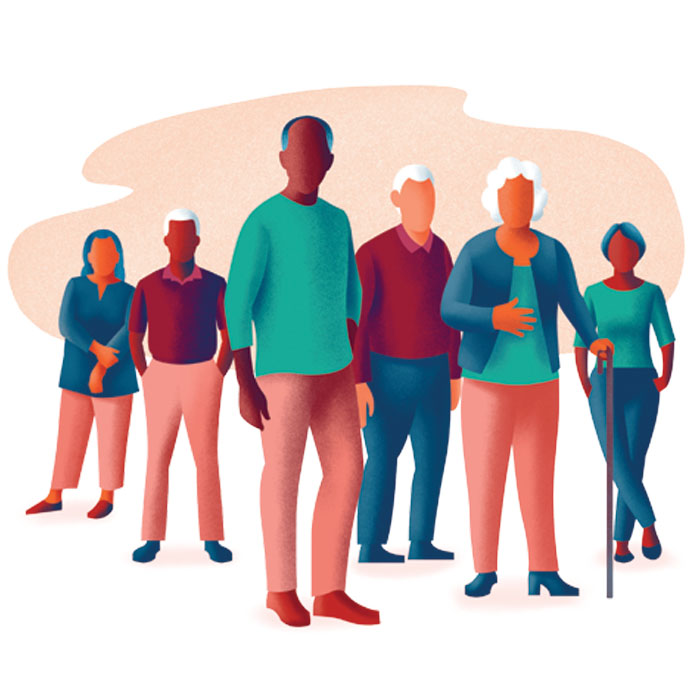
“MADURA has changed how I think about health care in the need for diversity in research,” said Nicolaas Ugalde, who participated in MADURA as a senior and graduated with a Bachelor of Science in General Biology in June 2022.
“I had no idea that a lot of research mainly focuses on Caucasians. But there are some differences in health care between races. For example, dementia and aging happen at different paces,” said Ugalde, who has ambitions of becoming a neurosurgeon. “I learned, being a Latino, that we age slower. I’ve seen it with my grandmother who recently started showing signs of dementia at 96.”
After the pandemic necessitated two years of virtual-only labs, Ugalde was ecstatic to have the opportunity to work in a wet lab. During his training, he attended the lab of Matthew Shtrahman, MD, PhD, in the Department of Neurosciences, who is investigating causes of neurodegeneration.
“These are experiences I may never have had without MADURA,” said Ugalde. “I could have gone my entire life just doing clinical work. When I’m in my residency, I’m going to look at patients differently, individually, and not just generalize.”
In addition to hands-on experience, the program supports trainee academic success and retention and promotes application to graduate and medical programs as well as entry into clinical or research careers in aging or ADRD.
“UC San Diego is a unique place for a program like MADURA because we have one of the largest neuroscience programs in the world and we have the Herbert Wertheim School of Public Health and Human Longevity Science,” said Steven Edland, PhD, MADURA principal investigator.
“Students graduating from the MADURA program have the tremendous advantage of having real-world job experience that will help them apply to graduate or medical schools and obtain research jobs out of college.”
Compassion in academia
In its first academic year – 2020-2021 – the school held classes amid a pandemic, but students, faculty and staff were also impacted by an intense national conversation about anti-Black racism, and structural and systemic racism faced by others. This context shaped the curriculum and demanded dramatic changes to teaching, learning and living.
“We have learned some important lessons during the pandemic. It became critically clear, as the dean of a new school of public health, that a conversation about racism had to be foundational to what we did in this new school if we are really going to dismantle the systems and the structures that promote racism and, as a result, promote less than optimal health outcomes across all of society,” said Anderson.
An early component was to invite all employees to participate in a 24-hour racial resilience seminar series that helped participants recognize systems that normalize racism, explore an individual’s role in perpetuating structural racism, talk compassionately about it and make sustainable changes that build a school with a harmonious foundation.
Systemic racism seemed to be making headlines daily. In a five-month period in 2020, in five separate incidents, five Black people were killed: Ahmaud Arbery, Breonna Taylor, Daniel Prude, George Floyd and Rayshard Brooks. Sadly, more followed, including rising violence against people of Asian descent.
To create a safe space for difficult conversations, the Compassionate Action Circle was introduced.
“We are all being impacted by these events. They impact our well-being, our productivity and our sense of safety and belonging,” said Martha Anderson, JD, MDiv, dean’s chief of staff.
“The Compassionate Action Circle is an approach to create a place where wellness is supported. We talked about steps to take when you are in a system that, by design, is oppressive to some people. What are the measures we can take to free all people from oppression that is perpetrated in the environment?”
Held in October 2021, the forum facilitated an open conversation that was needed to build a sense of community, said Kyle Choi, informatics project manager in the Herbert Wertheim School of Public Health.
“The Compassionate Action Circle was held during a time when many of our staff were only seeing UC San Diego’s reactionary like responses to JEDI-related current events,” said Choi. “The forum was perceived as more of an intentional and proactive effort.”
The Compassionate Action Circle adds a unique aspect to the school, which is the fostering of compassion into the academic space, said Sonia Jain, PhD, interim associate dean for Justice, Equity, Diversity, and Inclusion.
“Our students are impacted too. After the George Floyd incident, I put aside what I was planning to teach that day to have a conversation, a moment of healing,” said Jain. “We need a place to talk about the underlying issues of how it affects the principles of JEDI across the school, whether you are a student, faculty or staff.”
“The hope is that the Compassionate Action Circle and similar programs become part of the community so that when incidents happen, which unfortunately continue to occur, our school has a safe place to communicate.”
Experiential learning
Applying JEDI principles within the walls of the school may lead to more inclusive and healthier work and learning environments, but learning to apply these to the practice of public health is another undertaking altogether.
Abbasi was 13 years old when his family immigrated to the United States. Both of his parents had underlying health conditions; navigating the health care system was difficult.
“We faced many challenges, such as lack of health insurance, lack of information, cultural and linguistic barriers and discrimination. At such a young age, I had to take on the role of an interpreter for my family. It became my responsibility to find their doctors, make their appointments, take time from school to be present during their appointments and more,” said Abbasi, who was struggling with a new language and culture himself.
“Unfortunately, from those interactions, I realized that many physicians in the United States failed to consider our background and culture in their care. They simply looked at us as charts and diagnoses instead of practicing in the context of family, culture, and community.”
Abbasi, who was one of 20 students in the Bachelor of Science in Public Health (BSPH) Honors Practicum in his senior year, credits the program and other public health classes with helping him understand how social determinants of health affect individuals and the importance of looking at the big picture. He plans to apply this in a future career in medicine.
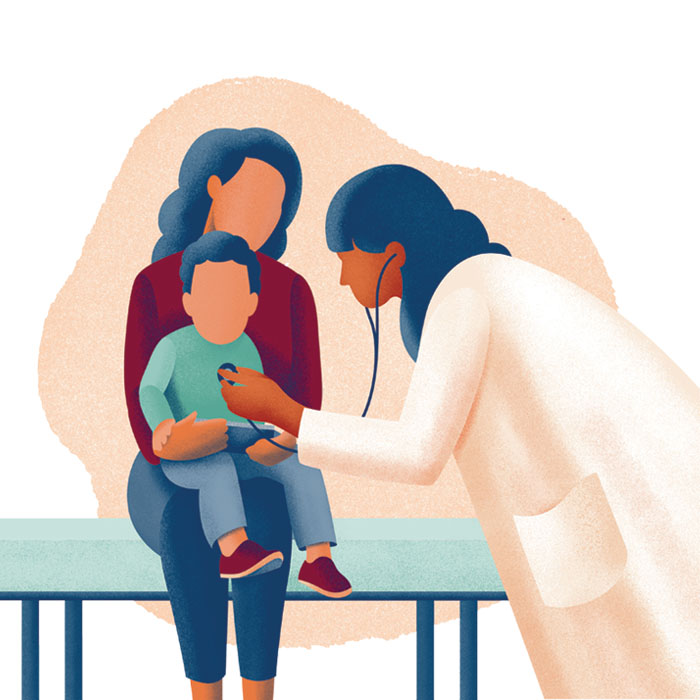
“If a child walks into my clinic with an infection, instead of prescribing antibiotics right away, I will also find out if that child has enough food at home or is he or she living with 14 other people in a one-bedroom apartment? Are there any cultural or language barriers that do not allow my patient or their family to understand their prescriptions? Can they afford transportation to my clinic and back?” said Abbasi.
“Instead of just putting a Band-Aid on their conditions, studying public health has taught me that it is also my duty to prevent future health issues before they even start.”
The BSPH program has grown from 400 students to more than 600 since the department of public health became a school. Students must apply to be part of the rigorous BSPH Honors Practicum, which spans three quarters of a student’s senior year. Only 20 are selected.
Nancy Binkin, MD, MPH, director of the BSPH Honors Practicum, looks for students who will apply the public health skills they learn in the program in their careers.
She selects stakeholder-driven, community-based public health programs to train students in teamwork and community service. In the 2021-2022 academic year, students helped a San Diego County school district evaluate teacher burnout during COVID-19 and provided the district with practical steps to combat it.
Another group worked with Orange and Riverside counties to assess drowning surveillance systems to identify data collection necessary for an effective system. Another team worked with the UC San Diego Academic Integrity Office to identify students’ perceptions on cheating on campus, how often they observe it and how likely they are to report it.
Students work directly with stakeholders, as they would if they were employees. Binkin requires perfection from their projects, and she finds great satisfaction in pushing students to perform beyond what is typically expected from an undergraduate program.
“This is what you leave behind in the world, the next generation who have an appreciation for public health and go on to do things you could never dream of doing,” said Binkin. “I get such energy out of being with these young folks and I feel that I am able to shape their careers. I get to do a lot of one-on-one mentoring of really talented young people.”
In addition to the BSPH program, residents in the General Preventive Medicine Residency participate in practicum rotations that train them in three areas: clinical preventive medicine, population-based medicine and research.
The Master of Public Health (MPH) program, which had a record 52 students in the 2021 cohort, up from 21 in 2018, requires all students to participate in a field-based or population-based practicum. Students pick projects relevant to current public health concerns, said Victoria Ojeda, PhD, MPH, director of the MPH practicum.
“The practicum makes students active participants in our communities by applying what they’re learning in the classroom in real-world public health settings,” said Ojeda.
“During these practical experiences, they receive mentorship from professionals who are working on important public health issues. We hope this will help them make career decisions on whether to go down one trajectory or another.”
MPH students have diverse backgrounds. Some have started their studies after earning their bachelor’s degree, but others are mid-career professionals who want additional training.
“As a new school of public health, we have committed to doing things differently from traditional schools and to take on new issues with greater priority than traditional schools give them,” said Michael Pratt, MD, MPH, professor, interim assistant dean for graduate education and director of the Master of Public Health program.
COVID-19 created both challenges and opportunities for the practicum as many organizations reduced workloads to essential employees only or transitioned to remote work, limiting students’ ability to gain hands-on experience.
But UC San Diego’s active COVID-19 response offered unexpected training directly with the university’s research and community programs.
“Students at UC San Diego have access to top notch translational research and community-based activities,” said Ojeda. “We are strongly positioned with ties to the community. And our location near the U.S.-Mexico border allows students to address issues and have experiences that they might not get at other schools. It makes for a very rich learning environment.”
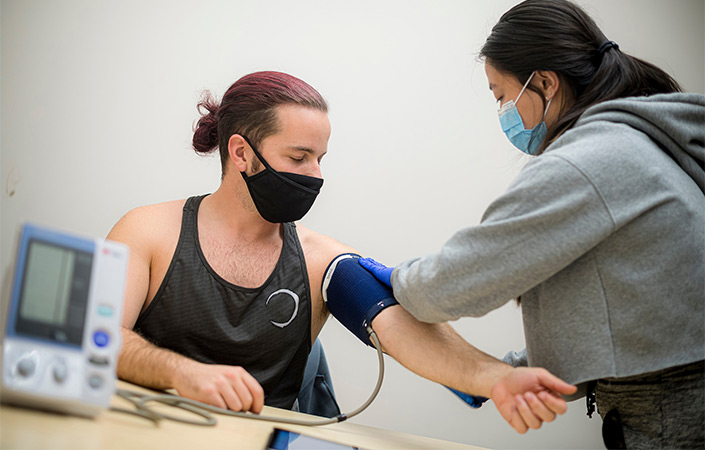
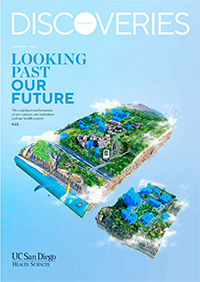
About Discoveries Magazine
This article was originally featured in the 2023 issue of Discoveries, the annual magazine from UC San Diego Health Sciences. Discoveries highlights the latest and greatest in the university's health science research, education and clinical practice. Other stories in this issue explore topics such as mindfulness meditation, wearable medical devices and a profile of new Vice Chancellor for Health Sciences, John M. Carethers.
Share This:
You May Also Like
Stay in the Know
Keep up with all the latest from UC San Diego. Subscribe to the newsletter today.
